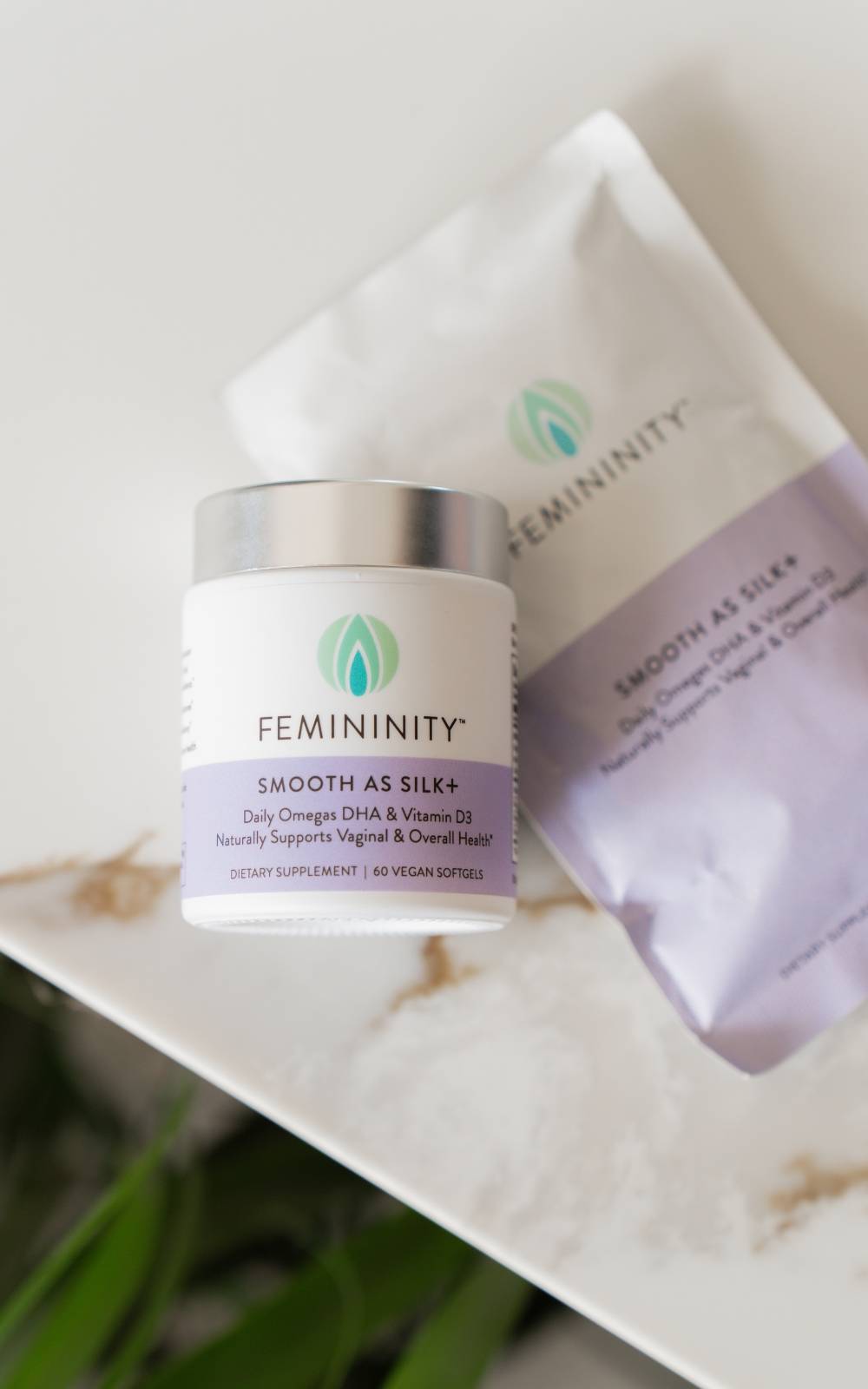Pain During Intercourse and its Causes
Nov. 11, 2025

Understanding Painful Intercourse and its Potential Causes
Pain during intercourse and its causes - Pain during intercourse is a deeply personal and misunderstood experience for many women. There’s the physical discomfort, but also the strain it can place on relationships, along with stress, emotional impact, and its effect on self-esteem.
Pain during sex is also something that many women experience, but often never have a conversation about with their doctor, or even a trusted friend.
Understanding the causes of pain during intercourse, including both physical and emotional contributors, is important for discovering how to regain comfort and enjoy pleasure in your intimate relationships again.
Pain During Intercourse: AKA Dyspareunia
Painful intercourse, also known in the medical community as dyspareunia, is estimated to be experienced by three out of every four women at some point in their lives. It refers to pain that occurs either before, during, or after sexual intercourse. While it’s common to experience an isolated incident of painful intercourse, dyspareunia is recurrent.
Dyspareunia can be felt externally, such as in the area of the vulva or vaginal opening. It can also be felt internally, including within the vagina, uterus, or pelvic area.
There are different ways that women experience painful intercourse. Some women feel it as pain that is sharp and stinging, often at the point of penetration.
Others experience discomfort as more of a consistent, deep pain that occurs throughout intercourse and lingers for a while after. There is also an entire spectrum of experiences in between.
Persistent pain before, during, and after intercourse can come with a significant emotional toll, creating anxiety and avoidance of intimacy. Understanding the causes of dyspareunia is the first step toward relief and healing.
Common Causes of Painful Intercourse
Vaginal Dryness and Thinning
One of the most common causes of pain during sexual intimacy is vaginal dryness. Most women experience vaginal dryness at some point, frequently caused by hormonal fluctuations.
Estrogen is one of the key players in maintaining vaginal moisture and elasticity. Anytime that estrogen drops, such as during menopause, postpartum recovery, and breastfeeding, the risk of feminine dryness increases.
Something that also happens in response to decreasing estrogen is thinning of the vaginal walls. This can lead to irritation and inflammation during sexual intercourse, sometimes even leading to small tears in the lining of the vagina.
Low Arousal
Sometimes, painful intercourse doesn’t have a strictly physical cause. It can be caused by dryness and tension related to inadequate arousal and emotional connection. This can make penetration uncomfortable or painful, and can lead to irritation that lingers after intimacy.
Pelvic Floor Dysfunction
The pelvic floor muscles are so important to a woman’s health. For starters, these muscles support the uterus, bladder, and bowel in a woman’s body.
If these muscles become weak or even too tense, they can cause pain during intercourse. Weak pelvic floor muscles can also cause urinary or bowel issues, leading to feeling self-conscious and stressed during intimacy.
Vaginismus
Vaginismus is a condition that causes an involuntary tightening of the vaginal muscles. This can happen in response to stimulation, such as penetration during sex.
Some women with vaginismus also experience symptoms when inserting tampons or during pelvic exams, so it’s not a condition related only to sexual intimacy. The muscle spasms can be weak, but they can also be severe, causing intense pain.
The exact cause of vaginismus isn’t always known, but it can be a response to past trauma, anxiety, fear of pain, infections, and pelvic inflammatory disease.
Infections and Skin Conditions
Certain infections, including yeast infections, urinary tract infections, and sexually transmitted infections, can cause uncomfortable and sometimes painful symptoms during intercourse.
Itching, burning, and pain associated with inflammation can make sexual intimacy a less-than-comfortable experience. Skin conditions, like eczema and lichen sclerosus, can sometimes affect the vulva and vaginal area, making any type of friction during intimacy uncomfortable.
Pelvic Conditions
Internal pain that is felt deeper in the pelvic area during intercourse can be caused by a number of pelvic conditions. Pain usually occurs with deeper penetration. Some pelvic conditions that can cause pain with sex include:
- Endometriosis
- Pelvic Inflammatory Disease
- Ovarian Cysts
- Uterine Fibroids
- Irritable Bowel Syndrome or Irritable Bowel Disease
Self-Care and Support for Relief of Painful Intercourse
Medical treatment is available for many causes of painful intercourse. For example, antibiotics or antifungal medications may be prescribed if the cause is an infection. Botox for pelvic spasms is sometimes used, as well as vaginal dilator therapy, hormone replacement, talk therapy, and surgical interventions.
In addition to medical treatments for dyspareunia, there are also gentler, self-care steps anyone can take to support their healing, reduce pain during intercourse, and provide ongoing comfort.
Support Vaginal Health with Supplements
Supplements, like sea buckthorn, are known for their ability to support mucosal health and hydration. For vaginal health, this translates to enhanced moisture and relief from symptoms of vaginal atrophy.
Sea buckthorn is rich in omega-7 fatty acids, which work wonderfully for supporting vaginal health by reducing dryness, nourishing vaginal tissues, and supporting elasticity.
If painful intercourse is caused by dryness or the discomfort and irritation associated with vaginal atrophy, supplements like Smooth As Silk+ can provide long-lasting relief.

Use Gentle Lubricants
For many women, a high-quality, gentle lubricant can be life-changing in relieving painful intercourse. Look for intimate lubricants that are water-based, especially if you are using condoms during sex.
Silicone-based lubricants are also an option and can provide longer-lasting lubrication. However, they should be avoided in people with even the slightest sensitivity to silicone.
Explore Comfortable Positions
Certain sexual positions increase friction or put additional pressure on the cervix, uterus, and pelvic area in general. Exploring different positions might be the only solution needed. Try positions that allow you to better control the angle and depth of penetration.
Prioritize Emotional Connections
For women, establishing an emotional connection is non-negotiable for comfortable (and pleasurable) sexual experiences. Talk with your partner about taking more time to build up arousal through conversation, touch, and strengthening emotional intimacy.
When an emotional connection and arousal are cultivated, it’s natural for the body to respond with increased lubrication and muscle relaxation that can make intercourse more comfortable.
Practice Pelvic Floor Exercise
Pelvic floor exercises work to both strengthen and relax pelvic muscles. Pelvic floor muscles are activated during intercourse and can cause pain when they are weak or too tense.
Simple, easy pelvic floor exercises like Kegels can be done anytime, anywhere. There are also physical therapists who specialize in the pelvic floor and can provide you with exercises that are more tailored to your individual needs.
Reclaiming Pleasure and Feeling Empowered in Your Intimate Life
Pain during intercourse is something that can be treated. You deserve to enjoy intimacy without fear of pain or discomfort. Whether pain during intercourse is intermittent or a constant fixture in your sex life, there are answers and relief available.
Smooth As Silk+ is more than just another supplement. Formulated with the amazing sea buckthorn, Smooth As Silk+ supports feminine health with the rare omega-7 fatty acid, omega-3 with DHA, vitamin D3, and more. It’s the first step to empowering self-care and experiencing the relief you deserve. Regardless of the cause of painful intercourse, high-quality sea buckthorn supports feminine health in so many ways.